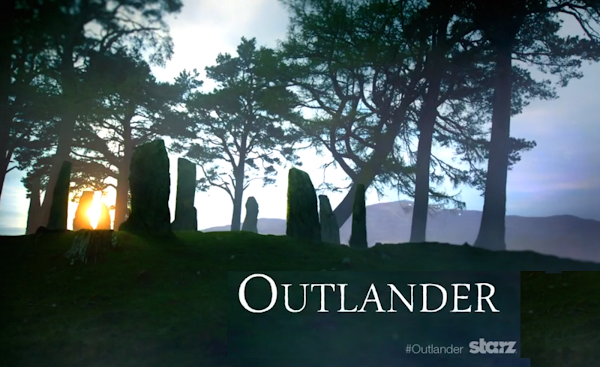Re-reading BEES (Part 6)

Here's Part 6 of my series of posts about things I've discovered on re-listening to Diana Gabaldon's GO TELL THE BEES THAT I AM GONE, Book 9 in the OUTLANDER series. (The other posts in this series are here.)
*** SPOILER WARNING!! ***
If you haven't read GO TELL THE BEES THAT I AM GONE, there are MAJOR SPOILERS below! Read at your own risk!
On the subject of Amaranthus: I can't deny that I had a very negative first impression of her when I read BEES the first time. I'm paying closer attention to her on this re-listen, and I wanted to share my impressions so far (through chapter 46).
In her first scene in BEES (Chapter 31), I picked up two interesting things that I hadn't noticed before.
1) She appears to be a good mother, who fired Trevor's nurse because of incompetence:
“I sacked her.”OK. I'll give her points for that, at least.
“Drunkenness?” he asked, recalling what Lord John had said about the cook.
“Among other things. Drunk on occasion--too many of them--and dirty in her ways.”
“Dirty as in filth, or ... er ... lacking fastidiousness in her relations with the opposite sex?”
She laughed, despite the subject.
“Both."
(From GO TELL THE BEES THAT I AM GONE by Diana Gabaldon, chapter 31, "Pater Familias". Copyright © 2021 by Diana Gabaldon. All rights reserved.)
2) On re-reading, I wonder if Amaranthus' vehemence against Continentals might be a reference to Ben having turned his coat?
“You have my deepest sympathies on the loss of your husband, madam,” [William] said. He wondered what she knew--had been told, rather--about Benjamin’s death, but it seemed indelicate to ask.Amaranthus, overcome by her emotions? It seems very unlikely to me. At first I thought, she's way over-reacting, in order to ingratiate herself with William, who presumably is a Loyalist like his father. And I still think that's possible. But then I had another, more intriguing thought.
[....]
“Thank you.” She looked away, her eyes lowered, but he saw her mouth--rather a nice mouth--compress in a way suggesting that her teeth were clenched.
“Bloody Continentals!” she said, with sudden violence. She lifted her head, and he saw that, far from being filled with tears, her eyes were sparking with rage. “Damn them and their nitwit republican philosophy! Of all the obstinate, muddle-headed, treasonous twaddle ... I--”
She broke off suddenly, perceiving his startlement. “I beg your pardon, my lord,” she said stiffly. “I ... was overcome by my emotions.”
(From GO TELL THE BEES THAT I AM GONE by Diana Gabaldon, chapter 31, "Pater Familias". Copyright © 2021 by Diana Gabaldon. All rights reserved.)
If she's known all along that Ben is not dead, AND that he has turned traitor, that would explain her vehemence on the subject of the Americans' "republican philosophy". If Ben hadn't been exposed to Tom Paine's COMMON SENSE, he might not have gone over to the American side, leaving her and Trevor in a precarious position.
I think her use of the word "treasonous" is a Major Clue there. She's angry at the Continentals for their political views, but not because her husband (allegedly) died in their custody?
This is something I definitely would not have picked up on without all the discussion about Amaranthus on TheLitForum since the book came out -- here and here, for example. (For those of you who don't know, TheLitForum -- formerly the Compuserve Books and Writers Community -- is the online forum where Diana Gabaldon hangs out. I've been moderator of Diana's section there since 2008. You have to sign up to read or post on the forum, but it's free.)
Finally, there's the scene between Amaranthus and William in Chapter 46, where Amaranthus makes a rather shocking proposition to William:
“Well,” she said, as reasonably as though she were describing the eating habits of a firefly, “it’s quite simple. You can’t renounce your title, but you could hand it on. Abdicate in favor of your heir, I mean.”My instant reaction: This is crazy!! She's known him only, what, a week or so? Less? And already talking about having his child, with or without the minor technicality of marrying him first? <rolling eyes>
“I haven’t an heir. Are you suggesting—”
“Yes, exactly.” She nodded approvingly at him. “You marry me and as soon as I have a son, you can give him your title, and either retire into private life and breed dachshunds or perhaps pretend to commit suicide and go off to become anyone you like.”
“Leaving you—”
“Leaving me as the dowager countess of whatever your estate is called, I forget. That might be slightly better than being the Duke of Pardloe’s penurious daughter-in-law, mightn’t it?”
[....]
"You needn’t marry me straight off, you know. We’d give it a go, and if the result is male, then you marry me, acknowledge the child, and--” She gave a flick of her hand in a silent “voilà.”
“I don’t believe I am having this conversation,” he said, shaking his head violently. “I really don’t."
(From GO TELL THE BEES THAT I AM GONE by Diana Gabaldon, chapter 46, "By the Dawn's Early Light". Copyright © 2021 by Diana Gabaldon. All rights reserved.)
So she's fastened herself onto him like a leech ("Money-grubber!" I thought, not for the first time) and her first thought is for herself, what she would gain from marrying him. Yes, her schemes would result in William gaining an heir, so that he can renounce his title, but that seems to be a secondary consideration.
Just as a sort of thought experiment, I'm trying to imagine the implications of Amaranthus' suggestion here, that she and William need not marry unless/until she gives birth to a son. So William would presumably keep her as his mistress (!), and they'd keep trying for a baby until she got pregnant, and repeat for however many pregnancies it took for her to bear a son? And presumably keep the relationship secret from William's family until/unless she actually did give birth to a son.
Never mind that pregnancy was by far the most dangerous thing a woman could do in the 18th century, as Diana Gabaldon has commented before with regard to Geneva, not something to be contemplated lightly! Or that a child born out of wedlock would be considered a bastard, as William is very well aware.
Um, sure, that's a reasonable plan -- if your aim is to give Lord John a heart attack when he finds out.... <g>
Seriously, though: It makes me think about Colum's arrangement with Dougal and Letitia as described in OUTLANDER chapter 34, "Dougal's Story". Dougal was lucky that it only took three months to conceive a son with Colum's wife. ("A boring damn job it was too," he told Claire.) Would they have kept trying for years if he'd given her a daughter instead, since the whole point was to give Colum an heir? (Just speculating, of course.)
I was prepared to give Amaranthus the benefit of the doubt, based on my slightly more sympathetic view of her when she first appeared in this book. But after re-reading this scene, I've changed my mind. My original view of her, from my first reading of BEES, holds up well here: She's an opportunist, who wants William only for his money and his title. I don't trust her One Bit, and I think William deserves better.
I hope he'll keep Lord John's advice in mind:
His father had warned him early on about marriage-minded young women with an eye to his fortune, and he’d met quite a few of them.I should add that this is my reaction up to this point in the book. It's possible I might change my mind by the time I get to the end, but so far my impression of Amaranthus is almost entirely negative. It's going to take a lot to change that.
(From WRITTEN IN MY OWN HEART'S BLOOD by Diana Gabaldon, chapter 86, "In Which Rosy-Fingered Dawn Shows Up Mob-Handed". Copyright © 2014 by Diana Gabaldon. All rights reserved.)
What about the rest of you? What do you think of Amaranthus?
Look here for the other posts in this series. I'll post more of my thoughts on re-reading BEES in the coming weeks. Stay tuned!







Comments